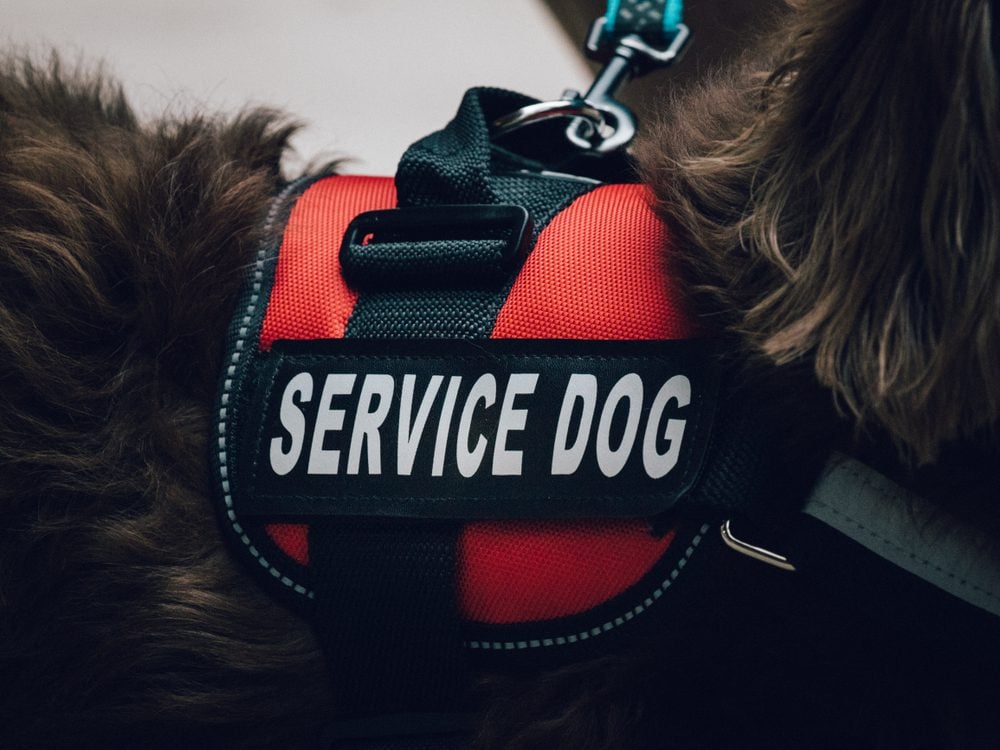Michiganders with disabilities typically own a service animal who can help them do work or perform certain duties that make their daily life easier.
But not just any animal can become a service animal; these unique animal caretakers often undergo extensive, rigorous training to help their human companions navigate these day-to-day tasks.
Fortunately, there’s also a host of federal and state laws that protect disabled people’s rights to have their service animal with them at home, in public, and on the job as well.
We’ll be exploring these federal and state laws in more detail here, diving into the specifics surrounding housing, employment, and public accommodations. Later on, we’ll also discuss how Michigan residents can register their service animal so that they are in compliance with these laws.
Before we go in-depth, though, let’s talk about the similarities and differences between the federal and Michigan state definitions of service animals.
How Does the State of Michigan Define a Service Animal?
Both the American Disabilities Act (ADA) and Michigan state law define service animals in the same way: dogs that are individually trained to do work or perform tasks for people with disabilities. The work, tasks, or duties this service dog performs must be directly related to their owner’s disability.
In special circumstances, this definition can also encompass miniature horses, in which case Michigan’s public accommodations laws will come into play. In the case of a miniature horse as a service animal, a public accommodation or facility in Michigan would factor in the horse’s weight and size, its owner’s ability to handle it, whether allowing it on the premises would compromise public safety, and whether it’s housebroken or not when deciding if it could accommodate the miniature horse.
Are Emotional Support Animals Protected by Law?
It’s also worth mentioning that many of these federal and state protections do not cover emotional support animals, which are animals that provide their owners a sense of emotional support, safety, or comfort in times of emotional or psychological distress.
Despite the therapeutic benefits they offer, emotional support animals receive no special training and therefore cannot carry out any disability-specific tasks or duties. Therefore, public accommodations and facilities in Michigan are not required to permit emotional support animals, unlike service animals.
If you’d like to learn more about emotional support animal laws in Michigan, check out our article here.
Service Animal Employment Laws in Michigan
When it comes to service animals in the workplace, federal law usually has the final say. The ADA’s employment provisions say that employers must make “reasonable accommodations” for their disabled employees, which can include allowing disabled employees to have their service dogs with them at work.
Generally speaking, employers are required to let disabled people bring their service dogs with them to work, except in rare cases when it would place “undue hardship” on the business’ operations. Two examples of undue hardship are if a service dog would place a significant financial burden on the employer, or if the service dog would cause enough of a disruption to disturb most of the employees or patrons present.
However, a disabled employee cannot just show up to work with their service dog without first putting in a request with their employer. Usually, the disabled employee must first file a request saying they need their service dog on the job with them to help them adequately perform the tasks required of them. This initial request may be submitted either orally or in written form, although the latter is recommended for records purposes.
Additionally, disabled employees will also likely need to furnish documents provided by their doctor or attending medical professional verifying their disability and outlining the specific tasks their service dog is trained to perform for them. If their request is granted, the employer will also need to allow their disabled employee enough flexibility to care for the service dog throughout the day, such as taking time to feed it or to let it outside to relieve itself.
Service Animal Housing Laws in Michigan
Here we also see federal law largely running the show, but this time in the form of the Fair Housing Act (FHA). Under the FHA, landlords and housing facilities must permit both service dogs and emotional support animals if it means the disabled tenant can enjoy the same opportunity to use and enjoy their living accommodations.
To enjoy protection under these laws, the disabled person must have a disability-related need for their service dog or emotional support animal. This means that the animal must do work or perform tasks or duties that are specifically related to their owner’s disability.
In the case of emotional support animals, the disabled owner must have a verifiable disability, and their emotional support animal must visibly alleviate their emotional discomfort in times of distress to meet these requirements.
One of the most obvious benefits of these housing regulations is the waiving of standard animal housing fees. However, this does not exempt owners from liability in cases where their service dog or emotional support animal damages the property or hurts another person on the premises.
Service Animal Public Accommodations Laws in Michigan
Once again, federal and Michigan state law dovetail nicely here. Both sets of laws define public accommodations very broadly, including places like:
- Restaurants and other establishments that serve food or beverages
- Service establishments
- Commercial and rental establishments
- Hotels and other lodging establishments
- Public transportation and terminals, stations, and depots
- Educational institutions
- Establishments where items are collected and put on display for public enjoyment or perusal, including libraries and museums
- Places of public gathering, including convention centers and auditoriums
- Places of exhibit and entertainment, including sports stadiums and theaters
- Exercise and recreational facilities, including zoos, bowling alleys, parks, and gyms
- Social service centers, including homeless shelters, food banks, and senior centers
Whereas the ADA establishes these public accommodations rights for disabled people, Michigan’s penal code makes the breaking of its service animal laws a misdemeanor. An example of breaking these service animal laws would be when a public accommodation or facility denies a disabled person and their service dog access to the accommodation or facility.
One key difference here is that these public accommodations protections do not extend to emotional support animals in the state of Michigan.
What Else Do I Need to Know About Service Animals in Michigan?
There are a few key instances when a disabled person’s rights to their service animal may legally be questioned or even revoked.
For example, a public accommodation or facility is within their rights to ask a disabled person if their service dog is required because of a disability and what duties or tasks they are trained to perform. They may not ask them any details about their disability, if the service dog has any documentation confirming their status as a service dog, or the service dog to perform the disability-specific tasks or duties on command.
What’s more, a public accommodation or facility may not treat a disabled patron differently, charge them additional fees, or separate them from other customers simply because they have a service dog with them.
Can I Be Asked to Leave Because of My Service Dog?
However, a disabled patron and their service dog may be asked to leave the premises if their service dog is not housebroken, is causing a nuisance to other patrons, or if the service dog is acting aggressively or threateningly. They may also be asked to leave if the owner is visibly not in control of their service dog.
It’s also on the disabled person to ensure that they’re in control of their service dog and that it’s wearing a harness as well. A public accommodation or facility may not, though, ask a disabled person and their service dog to leave if other patrons are either allergic to or simply afraid of it.
Do I Have to Register My Service Dog?
It’s also worth noting that there is no legal requirement to register your service dog. The benefits of registration are manifold, though, and may be especially useful should a disabled person find themselves in any of the above scenarios.
Where Can I Register My Service Animal?
To register your service animal on USAA, click here. For a little under $80, you’ll get:
- Lifetime registration for your service animal in the United States’ largest service animal database
- A Service Animal Registration Photo ID Card
- A Registration Certificate for your service animal
- Digital copies of your Registration Certificate, immediately available for download
- The option to order a vest for your service animal
- Full, 24/7 access to our legal team and support staff
You’ll also receive a card explaining these service animal laws and your rights, so that you may present it in response to any inquiries concerning the legal presence of your service animal. However, please note that registering your service animal on our website will not grant you any additional rights that are not already provided by the ADA and Michigan state law.
Final Thoughts on These Awesome Animal Caretakers
These specially-trained furry friends of ours can astronomically improve disabled people’s quality of life, whether it’s at home, in the workplace, or out in public. It’s a good thing, then, that both the federal government and the state of Michigan work together to protect the rights of disabled people so that they can more easily live functional and fulfilling lives.

